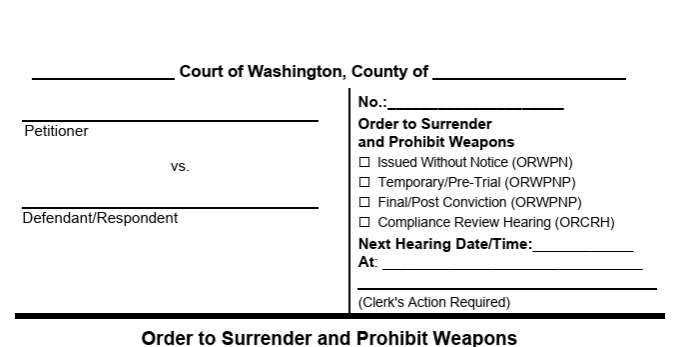Oct 02 2025 21:59
Understanding Washington's Weapon Surrender Orders: Not a Fourth Amendment Search
A recent decision by Washington's Division III Court of Appeals has clarified that a court order requiring individuals to surrender firearms under RCW 9.41.800 does not constitute a "search" under the Fourth Amendment. In the case of In re Domestic Violence Protection Order for Hernandez
(No. 40749-7-III), filed on September 30, 2025, the commissioner initially hesitated to order the surrender of firearms due to Fourth Amendment concerns. However, this decision was reversed, and the Court of Appeals directed compliance with the surrender order without invading the individual's privacy.
The Case Explained
In the Hernandez case, the Court of Appeals overruled a commissioner who had refrained from issuing a firearm surrender order, citing Fourth Amendment issues. The appeals court emphasized that a surrender order is simply a directive for the individual to bring their weapons to a specified location. Importantly, this process does not authorize law enforcement to physically search the home or rummage through personal belongings. Any search by police would still require a proper warrant.
Why This Matters
This ruling aligns with prior decisions, such as a Division One case where it was determined that an individual gathering items from their own home does not equate to a legal search. The Hernandez decision underscores the balance between enforcing protection orders and respecting constitutional rights. Even after the Rahimi ruling, which allows temporary disarmament of individuals deemed a credible threat, Washington's procedures remain compliant with federal standards.
Steps to Follow if You Receive a Surrender Order
- Read the Order Carefully: Understand the deadlines and locations for compliance.
- Surrender Firearms as Directed: Ensure all firearms, dangerous weapons, and concealed pistol licenses (CPLs) are surrendered.
- File Proof of Surrender: Submit evidence of compliance before the scheduled hearing.
- Attend the Compliance Hearing: Bring all required documentation to demonstrate adherence to the order.
Bottom Line: While surrender orders impose obligations, they do not nullify your constitutional rights. Compliance with a court's directive is mandatory, but it does not permit law enforcement to search your home without a warrant. Always consider seeking legal advice to navigate these orders effectively.
This information serves as a general overview and should not be taken as specific legal advice for your situation.

















